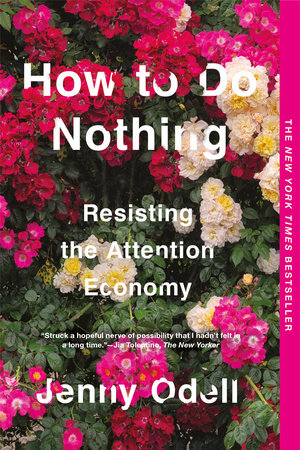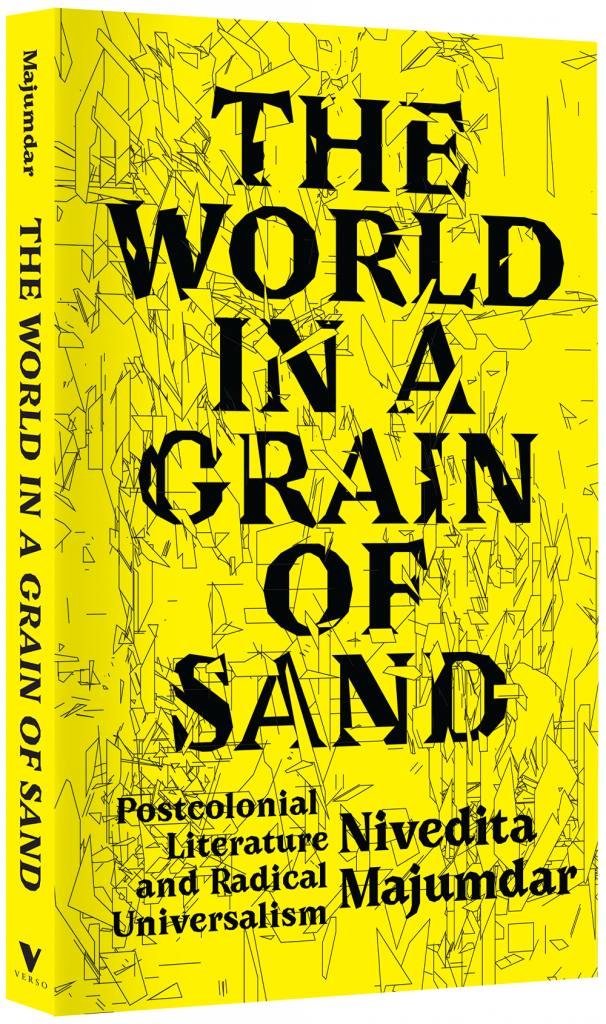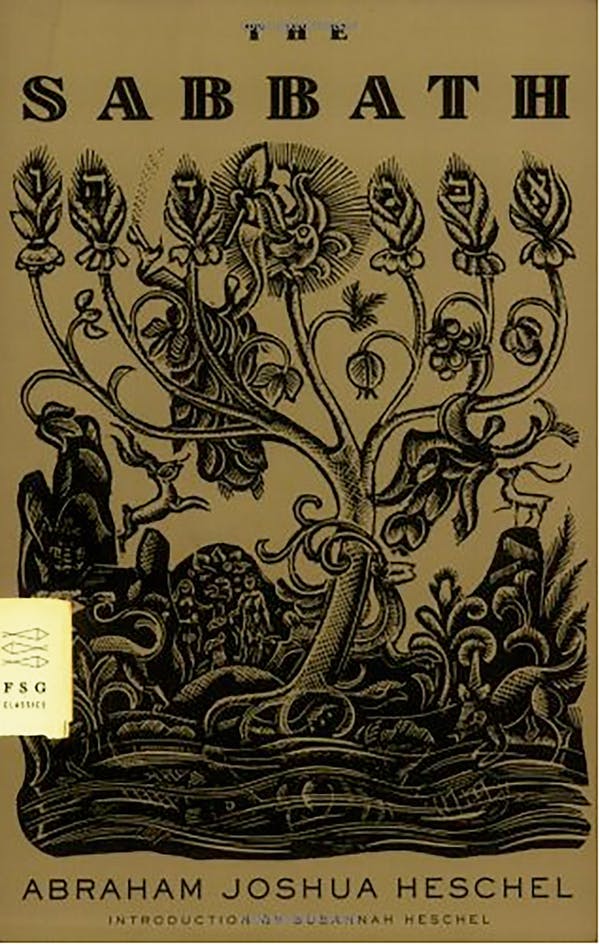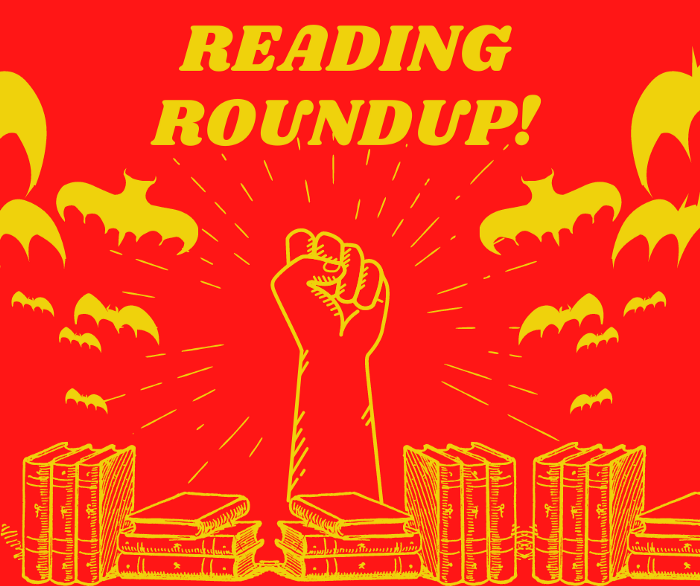Welcome to the Reading Roundup, a forum for ATX DSA members to share what they’ve been reading and how it’s informing their political education.
How to Do Nothing: Resisting the Attention Economy
by Jenny Odell

Feel like your personhood is being strip mined by the high technologies of late capitalism? This deceptively titled book argues that the key to decommodifying our attention isn’t unplugging, dropping out, or retreating from the world we’re in. Instead, in a series of conversational essays that wander from the Morcom Rose Garden through modern art, neighborhood crows, the performative philosophy of Diogenes, the 1934 San Francisco general strike, and a creek bed in Cupertino, Odell emphasizes not so much the subject of our awareness as keeping our awareness whole. She explicitly reminds us that our attention is political, recognizing it within the root of solidarity itself and urging us to tap deeper beyond the surface into the really real so we can brace ourselves, both individually and collectively, to stand against the currents of dehumanization. A deep breath of a read, highly recommended for comrades feeling burnt out in the era of Zoom organizing and Twitter discourse.
—Mike C.
The Cow with Ear Tag #1389
by Kathryn Gillespie

Kathryn Gillespie’s The Cow with Ear Tag #1389 is mostly about the life-long suffering endured by American dairy cows and their offspring. But it’s also about solidarity—and that non-human suffering should be insufferable for humans too.
Gillespie isn’t a farmer, or an activist, but an academic. The initial pages she devotes to her study methodology are illuminating. Before approving her book research, her university required her to attend the training required for all animal researchers: no coursework on empathy, but lots of instruction on how to euthanize mice. Apparently not many “animal studies” involve just observing creatures (or occasionally scritching them behind the ear).
In giving background like this, she highlights how our actions and language in exploitative industries reinforce power over capitalistic frameworks: both over cows and people. Elsewhere, processing her experience at a dairy expo, she explores how the sexualized language used to describe “good” dairy cows reinforces unhealthy dynamics between human men and women. Almost because she critiques power from a different lens—that of dairy—it encourages a lot of reflection about our entire modern world.
You’ll also come away from this book seriously rethinking your consumption of all animal products. Milk production is only possible because humans impregnate cows and then steal their newborns. Many “organic” or “antibiotic free” herds don’t treat sick animals—instead they get shunted into non-organic production, often resold through traumatic if not deadly livestock auctions into CAFOs (concentrated animal feeding operations). Gillespie tours the reader through the whole dairy system, including what happens to those newborn calves and how we raise our own kids (through 4H clubs and children’s books) to see animals as exploitable. Be prepared to have your heart broken open, then softly reborn when you read this book.
—Claire K.
The World in a Grain of Sand
by Nivedita Majumdar

My brother gave me this book as an approachable read for those unfamiliar with postcolonial literature—I had zero familiarity with it before. While parts of the book felt a little indecipherable (particularly the first chapter), I found it a fascinating and approachable read overall.
In part, this was due to the structure of the text. The book is split into two parts. The first part focuses on issues the author finds with well-regarded texts in the field. Each of the four chapters in this section highlights a central theme commonly associated with postcolonial literature (eg., agency, nationalism). These chapters are further divided into easily digestible subsections. The latter half of the book examines these same themes, but the example texts are presented in contrast to those in the first half to show how the issues noted might be addressed or avoided.
The other aspect that makes this book approachable to those unfamiliar with the field is that the book doesn’t simply focus on a critique of the field under the assumption that the reader has the requisite knowledge. Much of the book is devoted to summarizing the example texts – mostly fiction novels with the occasional essay or memoir as well. In addition to providing invaluable context, it kept me highly engaged (and also added a half-dozen books to my wishlist haha).
I would be curious to know how those familiar with postcolonial literature received the book, especially the critiques the author levies against the field. Regardless, I found it very engaging and am looking forward to reading some of the referenced books.
—Aaron F.
The Sabbath
by Abraham Joshua Heschel

The Sabbath by Abraham Joshua Heschel is, first and foremost, a religious text. While I will not assume nor imply that everyone reading is religious, I will say that there is something meaningful to be gained from reading spiritual works and thinking through how they may fit within the socialist milieu. This book is a tight 101 pages of musings and meditations on the meaning of the seventh day, the Sabbath, or Shabbat, in the Jewish faith.
Heschel felt that the teachings of Torah were a call to social justice. He was active in the Civil Rights movements of the 1960s and spoke out against war in Vietnam. He also wrote extensively on faith in the modern age. In The Sabbath, his main argument is that while much of modernity and Christian-influenced secular society is a “conquest of space,” Judaism is rooted in a similar, but opposed, lording over time. This manifests in the Sabbath, a day when no work is to be done such that it remains holy and emblematic of a time to come.
But how can this inform a socialist? Well, as Heschel writes, “The Sabbath as a day of abstaining from work is not a depreciation but an affirmation of labor.” Each informs and uplifts the other, for one cannot work with no rest, but it is also defeatist to rest and never work. It is a reminder that we, too, who fight for the benefit of labor, of the working class, must rest. A reminder that if we say we will build a better world, we have to practice now for what that world can look like. A world wherein we have fought, and we may rest.
—Gumbo
Interested in making a contribution to next month’s Reading Roundup? Send a 250-word blurb to redfault@austindsa.org!

